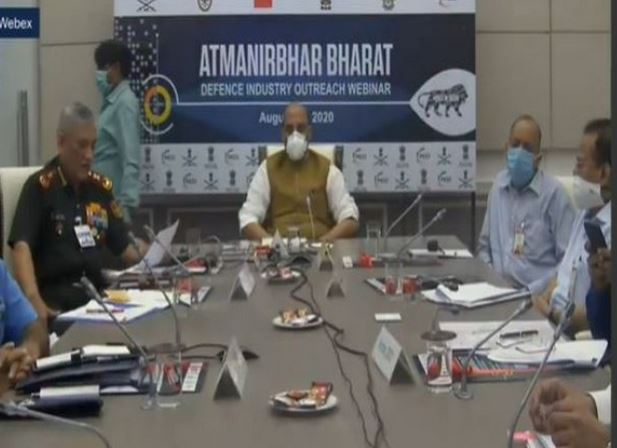New Delhi : With collaborative and cooperation efforts India will achieve not just ‘Make in India’ but also ‘Make for World’ in the defence sector, said Defence Minister Rajnath Singh here on Thursday.
Singh along with Chief of Defence Staff (CDS) General Bipin Rawat and others took part in the Defence Industry Outreach Webinar organised by Federation of Indian Chambers of Commerce and Industry (FICCI) and Defence Ministry.
“I am confident that through our collaborative and cooperative efforts, we will not only achieve ‘Make in India’ but also ‘Make for World’… We want to become self-reliant to contribute to the world in a better way. In this direction, some bold policy reforms have been taken like the ban on import of 101 defence items,” Singh said.
“This list is just a start, in the coming days it will result in approximately Rs 1.40 lakh crores of purchases domestically. The Defence Ministry has also for the first time released a draft of Defence Production and Export Promotion policy 2020,” he added.
According to Singh, the policy will work on “greater visibility” for upcoming opportunities so that the industries will get the demands of Armed Forces. He also asserted that the budget for procurement will be increased by 15 per cent per year.
The focus will be on exports, he said, adding that by 2025 the export target will be to achieve 25 per cent of revenue, which will be beneficial in achieving Rs 1,75,000 crore annual turnover target in the defence sector by the same year.
Singh and CDS Rawat, along with other officials, also released a booklet Department of Military Affairs, which encapsulates entire policy related to Atmanirbhar Bharat on defence during the webinar.
He also said a big part of the budget, Rs 52,000 crore in the current financial year, has been earmarked for purchases from domestic vendors and also spoke about the changes made in Defence Procurement Procedure, 2016 for helping the ‘Atmanirbhar Bharat’ cause.
Singh said efforts for becoming Atmanirbhar (self-reliant) had begun since Independence and highlighted the corporatisation of Ordnance Factory Board (OFB), setting up of defence corridors in Uttar Pradesh and Tamil Nadu, among others.
“We fully understand that investment in defence sector is different from others. The stakes are higher, the gestation period is longer and the technology used is cutting edge. Apart from these industries also face order and assurance issues. We have taken initiatives for them, we want our industries to compete in the global market and make our presence felt in new markets,” Singh said.
Rawat, speaking at the webinar, said the ministry “will reexamine defence requirements and prioritise those with indigenous research and development. Work towards corporatisation of Ordnance factories for a more efficient interface and integrate them into the layered defence ecosystem.”
“We have capability, capacity and will to produce high-end indigenous weapon systems. With government’s push in the right direction and vision of Atmanirbhar Bharat being promulgated, this is time to see this opportunity to achieve self-efficiency and becoming a net exporter of defence equipment,” Rawat added. (ANI)





